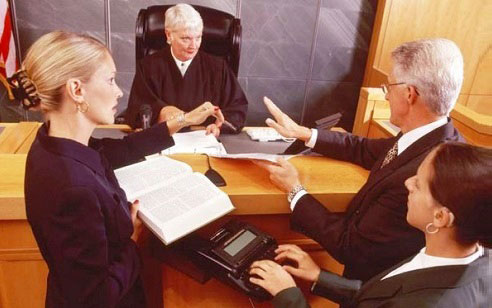Inheritance disputes are quite common. Russian legislation provides for the following settlement of the issue when such disputes concerning real estate arise: the inheritance is received by the person indicated by its owner in the will. Relatives who are left without an inheritance often have a fair question: is it possible to challenge a will for an apartment.
Who and how can challenge a will?
To successfully challenge a will for an apartment, you should know the following:
1 A will can only be contested in court. The corresponding claim is filed after the opening of the inheritance, that is, after the death of the testator or he was declared dead. 2 Who can challenge a will for an apartment? According to the law, this can only be done by the person whose rights and interests relating to this inheritance were violated by writing a will.- This includes the following categories of persons:
- heirs of the 1st stage (these are children, parents and legal spouses), if there are none - heirs of the next stage. These people, as a result of writing a will in favor of another person, were deprived of the right to receive a legal inheritance;
- the owner (co-owner) of the bequeathed apartment who did not give his consent to the testator to dispose of this property;
- a person whose property the testator disposed of illegally.
An elderly man decides to buy a one-room apartment.
The deposit has been transferred, the purchase and sale agreement has been signed by the buyer and the seller, and the package of necessary documents for registering the transaction has been submitted to the Registration Chamber.
Having learned about his serious illness, a man decides to bequeath his property (including an apartment) to his nephew.
After making a will, the testator dies suddenly.
The nephew claims his rights to the apartment, but the seller wants to challenge the will. Arguments given: the transaction was not registered because one of the certificates was issued with serious violations; the funds under the contract have not been paid in full.
Challenging a will for an apartment is possible only if the court is presented with weighty arguments so that it can recognize this document as illegal and invalid. If there are minor inaccuracies or clerical errors in the will that do not distort the essence of what was written, this will not be perceived by the court as a basis for declaring the document invalid.
It is important to remember that if the court finds the contested will invalid, another one drawn up earlier will come into force. Therefore, you should make sure that the testator has not left another expression of will.
Grounds and arguments for invalidating a will
When deciding on the illegality of a will, the court is guided by general and special grounds.

General grounds
The list of general grounds according to which a transaction can be declared invalid is presented in Chapter 9 of the Civil Code of the Russian Federation:
- Writing a will by an incapacitated person or a person with limited legal capacity (Article 171 of the Civil Code of the Russian Federation).
- Drawing up a document by a person who does not control himself and his actions at the time of signing it due to a mental disorder, illness, alcohol or drug intoxication or other reason.
- Making a will by deception or by promising the testator some benefit in return.
- Drawing up a will under duress: using threats, torture, mutilation, beatings, etc.
- Detection of facts of falsification (forgery of the testator's signature). In this case, the police must initiate a criminal case, and only on the basis of this fact the court makes a decision to invalidate the document.
- Drawing up a will that provides for the commission of actions contrary to the law (for example, the will indicates the possibility of registration of a person declared as an heir in a municipal housing, where only the testator himself can be the sole tenant).
Special grounds
A list of special grounds according to which a will can be revoked is given in Chapter 62 of the Civil Code of the Russian Federation:
- The document is incorrectly drawn up: there is no signature of the testator, there is no date, there is no notarization.
- The will was not drawn up or signed by the testator himself, which is prohibited by law.
- There are no signatures of witnesses or information about them, which is mandatory in some cases (emergency situation, closed wills, etc.).
- The object of the will is an apartment to which the testator does not have ownership rights.
- A will may become partially invalid if the testator has a disabled spouse, dependent parents, disabled children or minors - that is, those heirs who have the right to receive, by law, an obligatory share of the property left by the deceased.
- The witnesses who signed the will were:
- people in whose favor this will is made;
- a notary who certified the will;
- foreign citizens who do not know Russian well;
- illiterate people.
These are just the most common grounds that can be used to challenge a will. It must be remembered that in each case the question of its legality is decided individually. Suspicion of violations or infringement of the rights of any of the legal heirs should be the reason for their appeal to the courts.
Why does a notary certifying a will commit violations of the law, which then become valid grounds for its subsequent cancellation by the court? This question can be answered this way: a notary only certifies a document, but his competence does not in any way include checking the legality of the testator’s possession of the property that he wants to bequeath to another person.
Notarization is not the only legal way to certify a will.
The following may also do this:
- the head of local government, provided that there are no notary offices in the locality;
- captain of a ship (during voyage) or commander of a military unit;
- the head of a prison or colony, if the testator is in prison;
- expedition leader;
- the head physician (his deputy, or the doctor on duty) of the medical institution.
People in these positions may not be familiar with the legal intricacies of making a will at all. They are only authorized to certify the document, but are not able to check it for errors.
Unworthy heirs
One of the good reasons for canceling and invalidating a will for an apartment is the indication in it of unworthy heirs. Article 117 of the Civil Code of the Russian Federation provides a list of such persons. This:
- people who have committed a crime against the testator’s closest relatives and himself for selfish purposes (to receive an inheritance, increase the size of his share, etc.). The guilt of these persons must be confirmed in court;
- As an example, a real-life situation.
The second wife of the testator, having learned that he bequeathed his two-room apartment in equal shares to her and his two other children from his first marriage, enters into a criminal deal with the notary.
Together they prepare a second forged testamentary document, where the woman appears as the sole heir to the apartment.
The children of the deceased prove through the court a criminal conspiracy and forgery. The wife is deprived of her right of inheritance to a share in the apartment under the will of her husband.
- parents of the testator who were previously deprived of parental rights. Mentioning them in the will does not give them the right to receive an inheritance if the will is immediately challenged in court by the adoptive parents, grandparents, and other third parties;
- heirs who did not provide the testator with proper care or maintenance as provided by law.
- As an example, a real-life situation.
The son was obliged by the court to pay alimony to his father, but did not comply with this decision, which can be confirmed by the bailiff service.
Such a person may be recognized by the court as an unworthy heir under the will.
Evidence in court
If the plaintiff is sure that he definitely has the right to challenge the will for the apartment, he files a claim in court in the area or district where the disputed property is located.

Before doing this, it is important to gather as much evidence as possible regarding the existence of irregularities in the form of the will in order to win your case. Such evidence depends entirely on the grounds used to challenge the wills.
The following types of evidence are used:
1 Testimony of witnesses: relatives of the testator, persons who previously lived with him, neighbors, acquaintances, social service employees and anyone who is able to confirm that the will was drawn up illegally or the heirs are dishonest. 2 Medical certificates and evidence that the testator suffered from alcoholism, had a mental disorder, took drugs that had a strong effect on consciousness, or other facts. 3 Documents from the police or court that could confirm the fact that the heir committed a crime against the testator: forgery of a document, use of violence or other criminal act. 4 Certificate of post-mortem psychiatric examination, the result of which was confirmation of the presence of a mental disorder in the deceased. Such an examination is carried out at the initiative of the plaintiff before filing a statement of claim, or immediately after the start of the process.
The application submitted to the court must indicate:
- name of the judicial authority;
- information about the testator and heirs: about the plaintiff himself (challenger of the will) and about the defendant (heir under the will);
- information about the notary who certified the will;
- information about the contested will itself (where and when it was drawn up, information about the bequeathed apartment, etc.);
- the grounds according to which the disputed document could be declared invalid;
- in the conclusion there is a requirement to recognize the document as invalid.
When drawing up an application, it would be useful to have the help of an experienced lawyer who will take into account all the nuances and check the correctness of the claim.
Documents for filing a claim
The following documents must be attached to the application:
- plaintiff's passport;
- marriage certificate, birth certificate, other document through which the relationship with the testator or the right to file a claim will be confirmed;
- the will itself or a copy certified by a notary;
- documents for the bequeathed property;
- evidence of the illegality of the will;
- confirmation of payment of the state duty by the plaintiff;
- other documents provided at the request of the court.
Time limits for challenging a will

The period for possible challenge of a will for an apartment is identical to the statute of limitations established by law for any invalid transaction. Article 181 of the Civil Code of the Russian Federation defines the following terms:
- a will with violations or drawn up by an incompetent testator (a void will that does not give rise to any obligations) is contested within 3 years;
- a will signed by the apartment owner under duress (using violence or threats, fraudulently or otherwise) can be challenged within 1 year.
It is in the plaintiff's best interest to file a claim as early as possible. It is advisable to go to court as soon as the inheritance has been opened or within six months from that date.
At this time, the heir under the will cannot yet take possession and dispose of the apartment bequeathed to him.
How to avoid will disputes
In order to avoid problems for heirs, whether or not included in the will, the owner of the apartment, when drawing up the document, must pay special attention to ensuring that the document is written correctly: information about the testator - the owner of the property, future heirs and the apartment itself were indicated correctly, all signatures were placed , their transcripts, dates, etc.

You can also resort to additional means to confirm the legality of the transaction.
1 Make a video or audio recording of the process of writing a will to confirm the voluntary expression of the will of the testator. 2 Invite witnesses, making sure to indicate their details in the document; these persons will then be able to confirm the authenticity and legitimacy of the transaction in court. 3 Take care to obtain a certificate from a medical institution confirming that the testator does not have diseases that make him completely incapacitated or limit his legal capacity on the day the will is signed.You can also use other means that do not create danger and do not violate the rights of the remaining heirs and the testator himself. This cannot fully guarantee that one or all of the legal heirs will not want to challenge the will for the apartment, but it will contribute to resolving the dispute in court.
Judicial practice in matters of challenging wills on real estate is quite extensive, because apartments are objects of increased interest to both heirs and fraudsters.
Challenging a will for an apartment means proving the rightness of the deprived heir, recognizing the actions of the testator as inadequate or forced, and recognizing the will itself as invalid.
This will require collecting all available evidence and requesting the missing evidence at the request of the court.